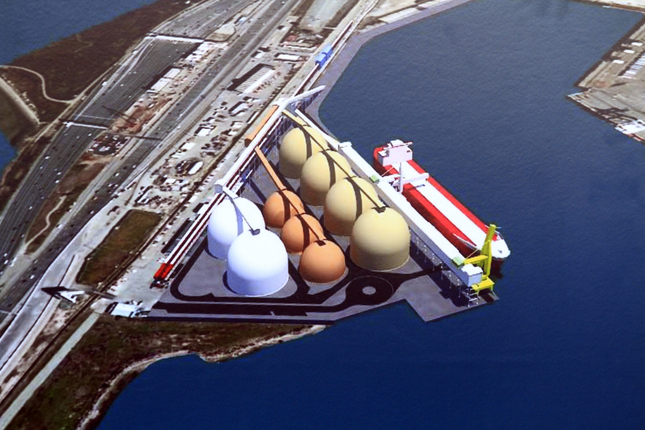Supporters of Shipping Coal Through Oakland, CA Say It Will Bring Jobs

By Erin Baldassari
May 25, 2016 - Without coal as a possible commodity for export, the planned bulk terminal near the Port of Oakland could be in jeopardy, a project official said Monday.
The terminal project, which represents a small portion of a massive redevelopment of the former Oakland Army Base, has become a flash point in the local debate over health risks and climate change ever since plans to transport coal through the terminal surfaced last year.
Jerry Bridges, CEO of terminal operator Terminal Logistics Solutions, said the company has not yet signed contracts with any company to ship coal through the facility located on West Oakland's Outer Harbor. But the Utah Legislature voted in March to invest $53 million of taxpayer money in the Oakland facility.
On Monday, supporters of the proposal urged city leaders to allow the ore to pass through West Oakland, citing the need for well-paying jobs to benefit area residents. Opponents of the plan say dust from train cars loaded with coal will further burden residents, who already suffer disproportionately from asthma and other respiratory problems caused by truck and auto emissions. Opponents also say that the export of the fossil fuel will exacerbate global warming.
On June 27, the Oakland City Council is expected to vote on a possible ban on coal, a first for the council since plans to transport the commodity first emerged. The council in 2014 approved a resolution banning the transport of coal and certain petroleum products in the city, but that resolution wasn't in place when the council signed a 2013 contract with developer Phil Tagami to redevelop the former base.
The contract did not mention coal exports. Since then, Tagami has said it is a possibility.
Bridges said the company plans to ship other commodities in addition to coal, including soda ash, potash, limestone, soybeans and other produce, adding that coal would constitute no more than 50 percent of the total commodities shipped through the terminal.
"There's no official agreement between Utah and (Terminal Logistics Solutions)," said TLS spokesman Harold Jones. "They are looking at this port with a keen interest and are expecting their full compliment of products of being capable of being shipped through the port. ... But, there's no conditions or contingencies at this point."
The terminal is designed to handle 9.5 million metric tons of bulk agriculture and mineral commodities, according to its website. Bridges estimated that the project could create around 1,000 construction jobs and 120 permanent jobs at the terminal itself, along with an estimated 2,400 to 2,500 related jobs in industries supporting the exports.
But labor leaders, including the Alameda Labor Council, International Longshore and Warehouse Union Locals 10 and 34, Service Employees International Union 1021 and others have denounced the project, saying ports along the West Coast have thrived without transporting coal.
The No Coal in Oakland Coalition, which includes elected and community leaders, labor unions and environmental organizations, also decried the transport of coal through the city. The Bay Area Air Quality Management District last week published a study outlining a large swath of West Oakland, including the area where the terminal is proposed, as a major area of concern for increased levels of particulate matter and toxic contaminants in the air.
"The West Oakland community cannot afford to have any more pollution dumped on us," the Rev. Kenneth Chambers, a pastor at West Side Missionary Baptist Church in West Oakland, said in a statement.
Dr. Geoffrey Watson of the Watson Wellness Center dismissed those concerns, saying the coal cars would be covered, and unloaded at an enclosed underground facility at the terminal before being loaded onto ships, preventing dust from blowing into the neighborhood.
Deborah Niemeier, a UC Davis professor and director of the Sustainable Design Academy, said there was little evidence to support that belief. The topping agents haven't been field tested, she said. Bridges said the manufacturer, EcoFab, tested the covers.
"The major public health problem here is lack of jobs, lack of income, not having the education that we need and not having the schools and the living resources and access to health care," Watson said. "Those are the main problems."

A rendering of the domes on the site of Oakland Global, a new shipping terminal at the former Oakland Army Base in Oakland, Calif., on Monday, May 23, 2016
Photo Courtesy of Terminal Logistics Solutions

